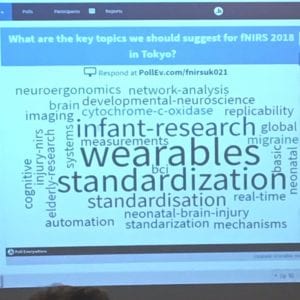Functional Near Infrared Spectroscopy Conference
By rmapapg, on 27 September 2017
By Nick Wood, MEng student
I was luckily able to attend the fNIRS UK conference free of charge on the 7/09/17.
For those of you who are not familiar with fNIRS, functional near infrared spectroscopy and its subgroup DOT, diffuse optical tomography, are exciting brain imaging technologies. They provide functional imaging by measuring the haemodynamic response associated with neuron activity and can be safely used at a patient’s bed side.
The proceedings opened with the first keynote speech delivered by our own head of department Jem Hebden, this interesting talk explained the some of the key differences between fNIRS and DOT and several of the challenges and benefits of designing DOT systems. The long history of the development of this technology at UCL was also explained.
Eight other talks followed illustrating the wide-ranging capabilities of this technology; varying from using to evaluate human computer interfaces, developing an optical biomarker of brain mitochondrial function and assessing the plasticity in the neural representation of language.
I found the second keynote talk of the day by Mr Daniel Leff particular interesting, the talk covered how fNIRS could be used to not only monitor the patient but could also be used to track the surgeon. By monitoring surgeons, the neurological differences between trainee, registrar and consultant surgeons could be spotted when undertaking different tasks, as true mastery of a skill was obtained the mental exertion required to perform this task was greatly produced. This could therefore be used as an assessment for consultant status, allowing a move away from the traditional training system of becoming a consultant after a certain amount of years of training. Ensuring people only reach the pinnacle medical role once they have truly mastered their surgical skills.
The conference closed with a humorous interactive session on the attendee’s thoughts for the future of the technology and possible talking points for the 2018 Tokyo meeting.
Overall, I had an interesting day learning about additional uses and developments of fNIRS/DOT and would like to say a thank you to all the speakers, sponsors and the programme/organisation committees for making the conference possible and free of charge.
 Close
Close



